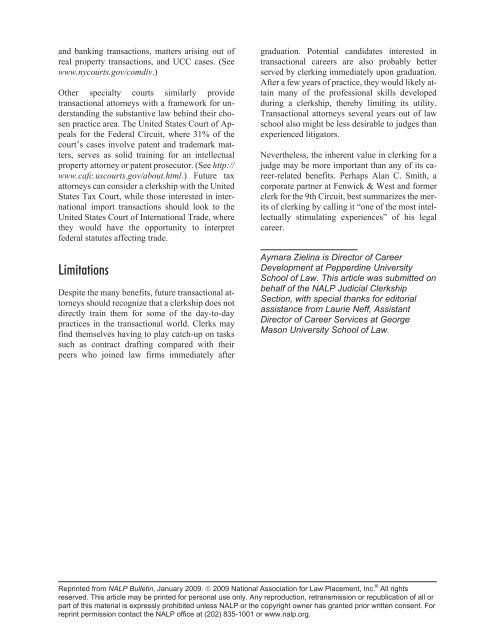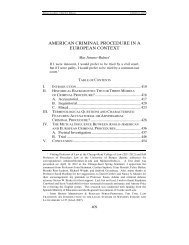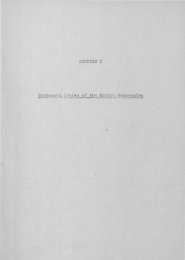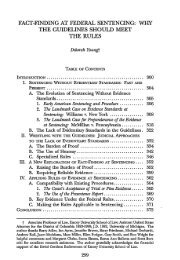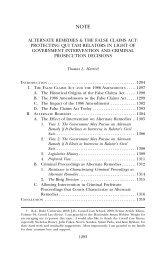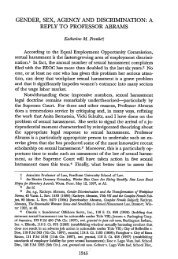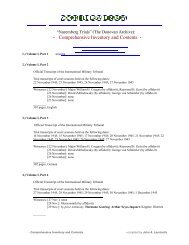JUDICIAL CLERKSHIP HANDBOOK - Cornell University Law School
JUDICIAL CLERKSHIP HANDBOOK - Cornell University Law School
JUDICIAL CLERKSHIP HANDBOOK - Cornell University Law School
You also want an ePaper? Increase the reach of your titles
YUMPU automatically turns print PDFs into web optimized ePapers that Google loves.
and banking transactions, matters arising out of<br />
real property transactions, and UCC cases. (See<br />
www.nycourts.gov/comdiv.)<br />
Other specialty courts similarly provide<br />
transactional attorneys with a framework for understanding<br />
the substantive law behind their chosen<br />
practice area. The United States Court of Appeals<br />
for the Federal Circuit, where 31% of the<br />
court’s cases involve patent and trademark matters,<br />
serves as solid training for an intellectual<br />
property attorney or patent prosecutor. (See http://<br />
www.cafc.uscourts.gov/about.html.) Future tax<br />
attorneys can consider a clerkship with the United<br />
States Tax Court, while those interested in international<br />
import transactions should look to the<br />
United States Court of International Trade, where<br />
they would have the opportunity to interpret<br />
federal statutes affecting trade.<br />
Limitations<br />
Despite the many benefits, future transactional attorneys<br />
should recognize that a clerkship does not<br />
directly train them for some of the day-to-day<br />
practices in the transactional world. Clerks may<br />
find themselves having to play catch-up on tasks<br />
such as contract drafting compared with their<br />
peers who joined law firms immediately after<br />
graduation. Potential candidates interested in<br />
transactional careers are also probably better<br />
served by clerking immediately upon graduation.<br />
After a few years of practice, they would likely attain<br />
many of the professional skills developed<br />
during a clerkship, thereby limiting its utility.<br />
Transactional attorneys several years out of law<br />
school also might be less desirable to judges than<br />
experienced litigators.<br />
Nevertheless, the inherent value in clerking for a<br />
judge may be more important than any of its career-related<br />
benefits. Perhaps Alan C. Smith, a<br />
corporate partner at Fenwick & West and former<br />
clerk for the 9th Circuit, best summarizes the merits<br />
of clerking by calling it “one of the most intellectually<br />
stimulating experiences” of his legal<br />
career.<br />
Aymara Zielina is Director of Career<br />
Development at Pepperdine <strong>University</strong><br />
<strong>School</strong> of <strong>Law</strong>. This article was submitted on<br />
behalf of the NALP Judicial Clerkship<br />
Section, with special thanks for editorial<br />
assistance from Laurie Neff, Assistant<br />
Director of Career Services at George<br />
Mason <strong>University</strong> <strong>School</strong> of <strong>Law</strong>.<br />
Reprinted from NALP Bulletin, January 2009. 2009 National Association for <strong>Law</strong> Placement, Inc. ® All rights<br />
reserved. This article may be printed for personal use only. Any reproduction, retransmission or republication of all or<br />
part of this material is expressly prohibited unless NALP or the copyright owner has granted prior written consent. For<br />
reprint permission contact the NALP office at (202) 835-1001 or www.nalp.org.


